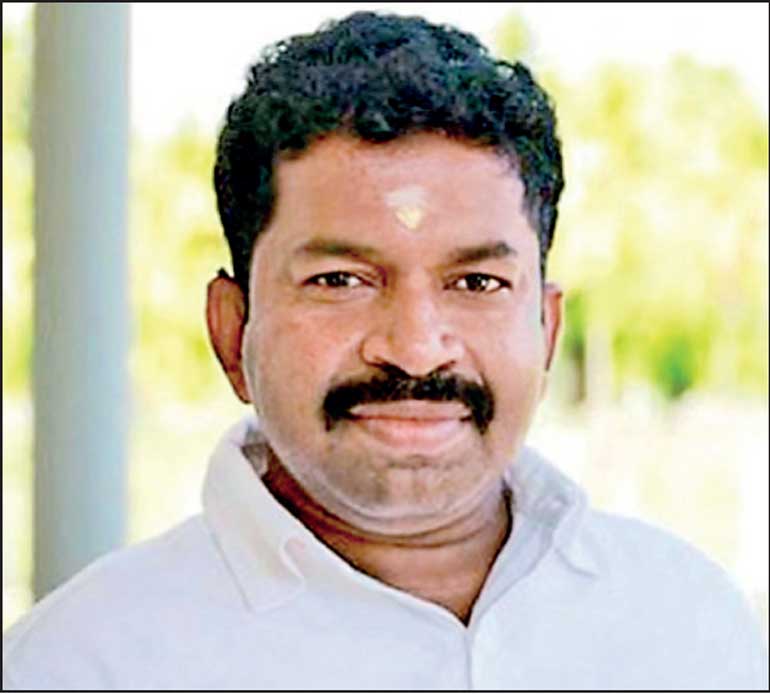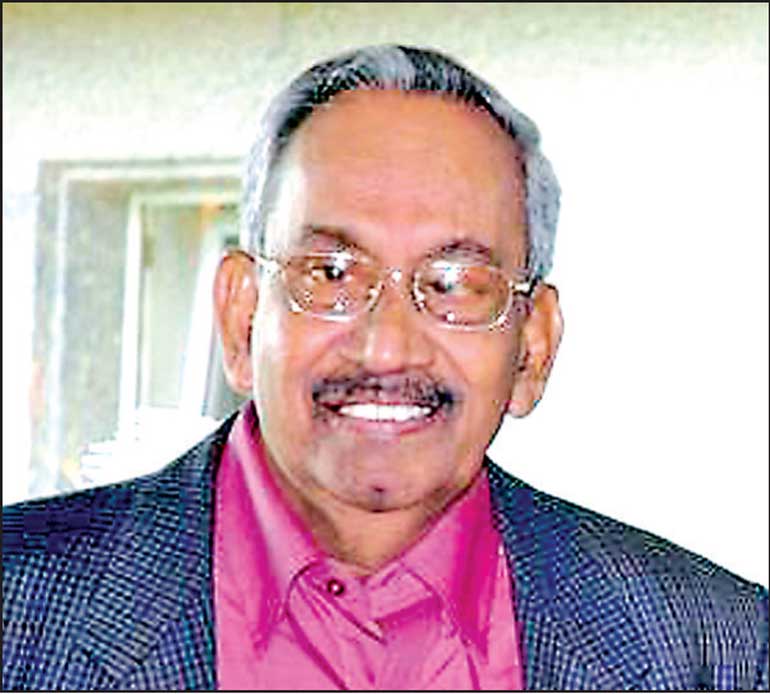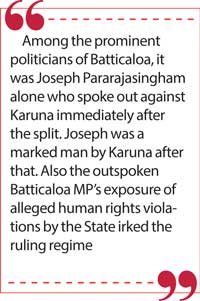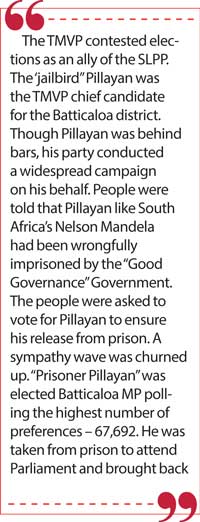Saturday Feb 14, 2026
Saturday Feb 14, 2026
Wednesday, 13 September 2023 00:50 - - {{hitsCtrl.values.hits}}

Sivanesathurai Chandrakanthan alias ‘Pillayan’

Joseph Pararajasingham
 State Minister of Rural Road Development and Batticaloa district Parliamentarian Sivanesathurai Chandrakanthan alias ‘Pillayan’ figured prominently in the recent documentary “Sri Lanka’s Easter bombings” aired by Britain’s Channel 4 TV in its “Dispathes” program on Tuesday 5 September 2023 at 11:05 p.m. The 47-minute-long documentary that is making waves pointed the finger at Pillayan as being implicated in the dastardly “terror” bombings of 19 April 2019.
State Minister of Rural Road Development and Batticaloa district Parliamentarian Sivanesathurai Chandrakanthan alias ‘Pillayan’ figured prominently in the recent documentary “Sri Lanka’s Easter bombings” aired by Britain’s Channel 4 TV in its “Dispathes” program on Tuesday 5 September 2023 at 11:05 p.m. The 47-minute-long documentary that is making waves pointed the finger at Pillayan as being implicated in the dastardly “terror” bombings of 19 April 2019.
Chandrakanthan alias Pillayan is the leader of the political party “Thamil Makkal Viduthalaip Puligal” (TMVP) meaning Tamil People Liberation Tigers. As is well known Pillayan was associated with former Liberation Tigers of Tamil Eelam (LTTE) eastern regional commander Vinayagamoorthy Muraleetharan alias “Col” Karuna in breaking away from the LTTE and forming an east-based party. Subsequently Pillayan ousted Karuna and became chief of the TMVP.
Chief among the whistleblowers featured in the Channel 4 film was Azad Maulana, the former spokesman of the Tamil Makkal Viduthalai Pullikal (TMVP), Pillayan’s political party. Maulana disclosed in the documentary that he had at the behest of Pillayan, arranged a meeting between former military intelligence chief Suresh Salley and members of the radical Islamic movement National Thowheeth Jamaath (NTJ) in 2018. He alleged that the April 2019 bombings were done to create a climate of fear to facilitate Gotabaya Rajapaksa getting elected as president.
Maulana claimed that after the meeting between NTJ and Salley was over “Suresh Salley came to me and told me the Rajapaksas need an unsafe situation in Sri Lanka, that’s the only way for Gotabaya to become president,” Maulana alleged that Pillayan and Salley engineered the release of NTJ members from prison before he arranged for Salley to meet them. “The attack was not a plan made in just one or two days, the plan was two, three years in the making,” stated Maulana in the documentary.
Pillayan responded to Azad Maulana’s accusations by castigating his former aide severely in Parliament. Pillayan also issued a statement in Tamil that was sent to the media and also posted on his facebook. The TMVP chief also gave media interviews denying involvement in the Easter Sunday bombings. A demonstration was also staged in Batticaloa condemning the documentary and Azad Maulana.
It does seem to appear that Pillayan is like a cat on a hot tin roof after the Channel 4 TV documentary was telecast. However being in hot water is nothing new for Pillayan the former child soldier of the LTTE. Chief among the troubles he encountered in the past was nearly five years of incarceration over the killing of former Tamil National Alliance (TNA) Parliamentarian for Batticaloa Joseph Pararajasingham. Provisions of the draconian Prevention of Terrorism Act (PTA) were used against him. After a protracted legal proceedings Pillayan was eventually acquitted and discharged.
It is against this backdrop that this week’s column – with the aid of earlier writings – revisits the Joseph Pararajasingham murder and the arrest, detention, release and acquittal of Sivanesathurai Chandrakanthan alias Pillayan. A short trek down memory lane is necessary to comprehend what happened then.
“Col” Karuna – TMVP
 Former LTTE Eastern warlord “Col” Karuna broke away from the LTTE in March 2004. The TMVP was the organisation co-founded by Karuna along with Pillayan and others like Mangalam master and Iniyabharathy. The TMVP was officially led by “Col” Karuna. However in the absence caused by Karuna’s clandestine sojourn in India and Nepal, his deputy “Pillayan” ran the show in the east. Pillayan was the de-facto chief of the TMVP when the de-jure leader Karuna was away.
Former LTTE Eastern warlord “Col” Karuna broke away from the LTTE in March 2004. The TMVP was the organisation co-founded by Karuna along with Pillayan and others like Mangalam master and Iniyabharathy. The TMVP was officially led by “Col” Karuna. However in the absence caused by Karuna’s clandestine sojourn in India and Nepal, his deputy “Pillayan” ran the show in the east. Pillayan was the de-facto chief of the TMVP when the de-jure leader Karuna was away.
Pillayan was in charge of the TMVP when Joseph Pararajasingham MP was assassinated in December 2005. Later in 2007, Pillayan ousted Karuna and took over the TMVP. In 2008 Pillayan made history by becoming the first Chief Minister of the Eastern Province. He served as CM till 2012. In 2015 he contested the Parliamentary poll but failed to get elected as MP.
Former journalist and entrepreneur Joseph Pararajasingham became an MP representing Batticaloa District in 1990. He remained an MP continuously for 15 years until his demise in 2005. When LTTE eastern military commander Vinayagamoorthy Muraleetharan alias “Col” Karuna revolted against Veluppillai Prabhakaran’s leadership in 2004, most TNA politicians were conspicuous by their silence.
Among the prominent politicians of Batticaloa, it was Joseph Pararajasingham alone who spoke out against Karuna immediately after the split. Joseph was a marked man by Karuna after that. Also the outspoken Batticaloa MP’s exposure of alleged human rights violations by the State irked the ruling regime.
Realising he was a target, Joseph avoided coming to Batticaloa unnecessarily for many months. Yet he did come to Batticaloa a few weeks before Christmas in 2005 with the intention of staying on till New Year.
Joseph Pararajasingham
71-year-old parliamentarian Joseph Pararajasingham was shot dead at the St. Mary’s Cathedral in Batticaloa around 1:10 a.m. on 25 December 2005. Pararajasingham was attending the Christmas midnight mass conducted by Bishop Kingsley Swampillai, the Catholic prelate for the Trincomalee-Batticaloa Diocese. He was returning to his pew after partaking of Holy Communion at the hands of the Bishop, when two assassins walked forward and opened fire. While Joseph was killed his wife Sugunam and seven others were injured in the firing.
Mahinda Rajapaksa was then the newly elected president of Sri Lanka. There was very little progress in the investigations into Joseph Pararajasingham’s murder for almost 10 years during Rajapaksa rule. The motions of an investigation were conducted lackadaisically for a while and then the probe came to a standstill.
Things began changing after the Government of President Maithripala Sirisena and Prime Minister Ranil Wickremesinghe came into being in 2015. Some of the investigations shelved during the Rajapaksa regime were reactivated. The CID began pursuing a number of cases that had been put into cold storage including the Joseph assassination case.
Pradeep Master/’Gajan Maamaa’
On 4 October 2015 a team of CID officials led by Chief Inspector Ravindra Wimalasiri arrested two stalwarts of the Tamil Makkal Viduthalai Puligal (TMVP) namely Edwin Silva Krishnanandaraja alias Pradeep Master and Rangasami Kanaganayagam alias ‘Gajan Maamaa’ in Batticaloa. Pradeep Master was the District Coordinator of the TMVP in Batticaloa.
Chandrakanthan alias Pillayan got into hot water after his deputies Krishnanandaraja alias Pradeep Master and Kanaganayagam alias ‘Kajan Maama’ were taken into custody over the Pararajasingham assassination. Both were detained under the PTA and interrogated. During interrogation, they reportedly made “voluntary confessions” pointing the finger at Pillayan as their “boss” at the time Pararajasingham was killed.
According to the confessions, the assassin who shot Joseph Pararajasingham dead in the cathedral was Palanithamby Shashidaran alias “Shanthan”. Krishnanadarajah alias Pradeep Master claimed in his confession that Pillayan had instructed him by telephone to proceed from Vakarai to Batticaloa town with Shanthan and collect the necessary weapons from the “Patpodi” camp.
Pradeep master said he was ordered by Pillayan to accompany Shanthan to St. Mary’s Cathedral where Pararajasingham was killed during Christmas mass. It was however established during interrogation that the assassin Palanithamby Shashidaran alias “Shanthan” was no more among the living.
Taken into custody
 Following the two confessions implicating Chandrakanthan alias Pillayan, the TMVP leader was taken into custody after a detention order was issued under the PTA. Initially, a team of Police officers went to Batticaloa to arrest Pillayan. His family, however, said that Pillayan was not at home though his vehicle was seen parked on the premises. The Police then informed the family that Pillayan was to present himself to the Police in Colombo on 11 October 2015.
Following the two confessions implicating Chandrakanthan alias Pillayan, the TMVP leader was taken into custody after a detention order was issued under the PTA. Initially, a team of Police officers went to Batticaloa to arrest Pillayan. His family, however, said that Pillayan was not at home though his vehicle was seen parked on the premises. The Police then informed the family that Pillayan was to present himself to the Police in Colombo on 11 October 2015.
The ex-Chief Minister who was at one time in charge of law and order in the Eastern Province adhered to the Police summons and presented himself accordingly. He was accompanied by a lawyer. The Police, however, took him into custody under a 72-hour detention order issued under the PTA.
After interrogation for three days, the Police produced ex-Chief Minister Sivanesathurai Chandrakanthan in courts for the first time on October 14, 2015 and sought more time to keep the suspect in custody and question him further regarding the Pararajasingham murder.
Since Joseph Pararajasingham was a Member of Parliament at the time he was killed, the Police invoked the PTA to detain, investigate and interrogate suspects. The suspects including Pillayan were denied bail under the PTA. Pillayan mounted several legal challenges against his prolonged detention.
Pillayan indicted
After a protracted investigation, the Attorney General indicted Pillayan (who was 3rd accused) in October 2017 with six other persons in the High Court of Batticaloa for offences committed under Sections 32, 102, 113[b], 140 and 146 of the Penal Code read with Section 2[1][a] , 2[i] and 3[b] of the Prevention of Terrorism [Temporary Provisions] Act No. 48 of 1979 as amended by Act No. 10 of 1982 and Act No. 22 of 1988 in connection with the killing of former Member of Parliament for Batticaloa District Joseph Pararajasingham.
Among the seven persons originally named in the indictment was a purported Indian intelligence operative called “Menon”. He was the 7th accused. However at the commencement of the trial, the State requested the court to remove the name of the seventh accused “Menon” from the indictment as there were no further details available regarding him other than a slight mention of his name in one of the two confessions.
With the deletion of Menon, the remaining six indicted were, Edward Silva Krishnanandaraja alias Pradeep Master, Rengasami Kanganayagam alias Kajan Maama, Sivanesathurai Chandrakanthan alias Pillayan, Meera Lebbe Kaleel alias Suresh alias Manjula alias Salaam, Ariyanayagam Dharmanayagam alias Olapatti Kumar and Gunasinghe Arachchige Tharindu Madusanka alias Vinoth. Of these Ariyanayagam Dharmanayagam and Tharindu Madushanka were tried in absentia. Subsequently, it was established while the trial was in progress that Madushanka alias Vinoth was also dead. His name too was removed from the indictment.
“Voir Dire” inquiry
The key element or mainstay of the prosecution’s case was the purported statements amounting to confessions made by Pradeep Master and Kajan Maama. Both the accused subsequently retracted their statements and said they had been procured through coercion. This led to a “Voir Dire” inquiry to ascertain the truth of these retractions and determine the admissibility or inadmissibility of the confessions. When the Voir Dire inquiry concluded, the Batticaloa High Court ruled that the statements had been made voluntarily and therefore were admissible.
Thereafter the first two accused filed petitions before the Court of Appeal challenging the decision. The legal team appearing on behalf of the petitioners reiterated the position that the confessions/statements were not admissible. After examining arguments by both sides the Appeal Court ruled that the confession was inadmissible.
“Inducement or threat”
Media reports of the ruling are hazy but it appears that when the statement was originally made to Court, the Judge had told Pradeep Master in Tamil to keep in mind that his statement could be beneficial or detrimental to him (“Nanmaiyum Nadakkalaam, Theemaiyum Nadakkalaam”). It was argued that this amounted to an “inducement or threat”. Therefore the confessions obtained under duress were not valid or admissible. The Appeal Court upheld this reasoning.
Meanwhile the Easter Sunday bombings of churches and hotels took place on 21 April 2019. This created an environment where people wanted a strong leader to maintain security. Gotabaya Rajapaksa was elected President in November 2019. Parliament elections were held in August 2020. The Sri Lanka Podujana Peramuna and its allies swept the polls.
“Prisoner Pillayan” elected MP
The TMVP contested elections as an ally of the SLPP. The ‘jailbird” Pillayan was the TMVP chief candidate for the Batticaloa district. Though Pillayan was behind bars, his party conducted a widespread campaign on his behalf. People were told that Pillayan like South Africa’s Nelson Mandela had been wrongfully imprisoned by the “Good Governance” Government. The people were asked to vote for Pillayan to ensure his release from prison. A sympathy wave was churned up. “Prisoner Pillayan” was elected Batticaloa MP polling the highest number of preferences – 67,692. He was taken from prison to attend Parliament and brought back.
With the confession by the two TMVP stalwarts being deemed inadmissible by the Appeal Court, the Batticaloa Courts had to grant bail to the accused persons including Pillayan. It was granted on 24 November 2020 but a travel ban was imposed.
However, there was a pertinent question as to whether the Attorney General intended to proceed with the case or not. Time was granted by Courts to the AG to arrive at a decision. The AG informed Courts the next day that he intended proceeding with the case notwithstanding the Appeal Court ruling. A new date, 13 January 2021, was fixed.
On 11 January 2021 Deputy Solicitor-General Madhawa Tennakoon informed the Batticaloa High Court that the Attorney-General would not be proceeding with the case. “Nolle Prosequi” was a foregone conclusion after the invalidation of the “confessions”. Following this Batticaloa High Court Judge D.S. Soosaithasan acquitted all the accused including Sivanesathurai Chandrakanthan alias Pillayan on 13 January 2021.
State Minister
Pillayan returned home to his mother to celebrate the “Thai Pongal” festival joyfully on 14 January. The man kept in jail from October 2015 to November 2020 for five years under the PTA was a freebird at last. Pillayan was appointed State Minister of Rural Road Development in April 2022.
Pethalai
Let me conclude this article with a brief sketch of Pillayan’s life up to the time he became Eastern Province chief minister. Sivanesathurai Chandrakanthan hailing from the Pethalai village in Batticaloa district was born on 18 August 1975. He had his primary education at Vipulananda Vidyalayam in Pethalai and secondary education at Valaicchenai Hindu College. Chandrakanthan known as Chandra to family and friends joined the LTTE in 1990 at the age of 15.
What motivated Chandrakanthan to do so was an ugly incident in which some security personnel brutally assaulted and hospitalised his favourite cousin. Feeling helpless at being unable to prevent the assault, Chandrakanthan voluntarily joined the LTTE as a child soldier.
The name “Pillayan”
Chandrakanthan known as Chandra was initially given the nom de guerre “Kuberan” by the LTTE. However, he soon became known as Pillayan. What happened was that Chandrakanthan alias Kuberan was housed at a training camp with 39 other new recruits in the jungles of Vadamunai in the Batticaloa District. He was the youngest in the batch of 40.
Chandrakanthan was quite chubby in those days. One of the trainers Karunakaran began teasing him saying he was a “Kundan” (fatty) who resembled a “Kutti Yaanai” (baby elephant). Karunakaran also dubbed him as “Pillayar” (the elephant-faced God Ganesh or Ganapathy). The name caught on with a slight change. Instead of being called Pillayar with an “R”, he became known as Pillayan with an “N”. This was how “Pillayan” got his nom de guerre. Pillayan also means child.
Trusted confidante
Pillayan participated in several LTTE operations in the East and Wanni but did not distinguish himself in combat. However, he became a trusted confidante of the LTTE Batticaloa-Amparai commander “Col” Karuna. After the ceasefire of 2002 Pillayan was deployed in Kurunegala as an intelligence operative.
In early 2004, Pillayan was summoned to Batticaloa by Karuna. At a secret conclave in Tharavai, Karuna indicated that he wanted greater autonomy for the eastern tigers and was going to raise that demand with LTTE supremo Prabhakaran. Pillayan was to recall later that he extended full support to Karuna on this issue while sipping mineral water. He had however cautioned Karuna that care should be taken to avoid a split in the LTTE.
Pillayan was back in Kurunegala when Karuna raised the banner of revolt in March 2004. He immediately returned to Batticaloa. Despite the fracture, Pillayan entertained hopes of rapprochement with the mainstream LTTE but the fighting along the banks of Verugal River in April 2004 changed his mind.
Horrified by the massacre of Batticaloa tigers by the mainstream LTTE, Pillayan resolved that the eastern LTTE dissidents should form their own group and function independently under Karuna. The breakaway eastern tigers formed the Thamil Eelam Makkal Viduthalai Puligal (TEMVP) in 2004. It was later changed to Thamil Makkal Viduthalai Puligal (TMVP).
Deputy Leader
Karuna was the TMVP leader and Pillayan the deputy leader. While Karuna remained in Colombo and later went to Nepal and India, Pillayan holed up in the jungles along Polonnaruwa district borders. Pillayan led the TMVP in the field in the east.
The TMVP was allegedly responsible for many human rights violations and crimes against humanity during the 2006-2008 period. It was also of great assistance to the armed forces who began re-establishing full territorial control over the east during this period. Soon Pillayan became more popular than Karuna with ex-tigers of the east. Sri Lankan intelligence officials handling the TMVP also found it easier to interact with Pillayan instead of Karuna.
Karuna ousted
There was a Coup d’etat within the TMVP in April 2007. Karuna was ousted as leader and replaced by Pillayan. A disgruntled Karuna was sent to the UK to re-join his wife and children as a consolation prize. Karuna was however arrested by British authorities and imprisoned. After some months he was released and deported to Sri Lanka.
Meanwhile, the armed forces brought the Eastern Province under the writ of the Sri Lankan Government. The Northern and Eastern Provinces that were merged temporarily due to the Indo-Lanka accord of 1987 had been de-merged with effect from 1 January 2007 by a Supreme Court ruling.
Child soldier to Chief Minister
Elections were held for the Eastern Province Council in June 2008. The ruling United People’s Freedom Alliance (UPFA) decided to take the TMVP into its folds and contest the elections. The UPFA/TMVP combine won 20 of the 37 seats. President Mahinda Rajapaksa and UPFA strategist Basil Rajapaksa opted to have a Tamil chief minister for the first Eastern Provincial Council administration. Pillayan the LTTE child soldier made history by becoming the first Eastern chief minister.
(The writer can be reached at [email protected].)